NRSG367: Exploring Transition to Professional Nursing - Discussion
VerifiedAdded on 2023/06/07
|10
|1964
|430
Discussion Board Post
AI Summary
This discussion forum post explores the transition from student nurse to registered nurse, focusing on the challenges and strategies for success. It delves into the 'expectation of role' as a key challenge, proposing a 'Role Theory based strategy' to address it. The post analyzes the legal and ethical differences between student and registered nurse roles, providing a personal example to illustrate these differences. Furthermore, the discussion examines the positives and negatives of using social media in professional practice, emphasizing the importance of balancing its benefits with potential risks such as privacy violations. The author concludes by advocating for the strategic use of social media to enhance patient care and professional development while acknowledging and mitigating its potential drawbacks. Access more solved assignments and resources on our platform.
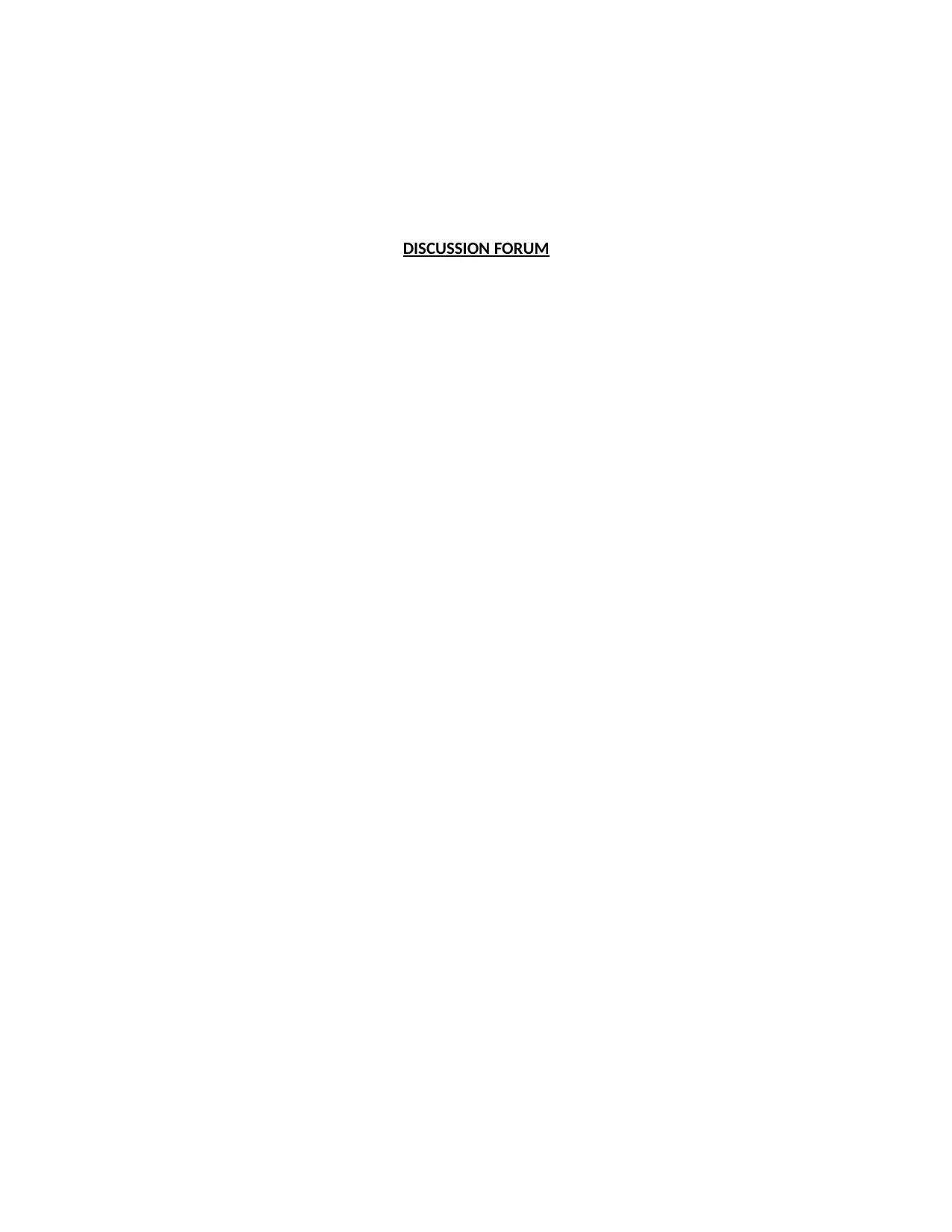
DISCUSSION FORUM
Paraphrase This Document
Need a fresh take? Get an instant paraphrase of this document with our AI Paraphraser
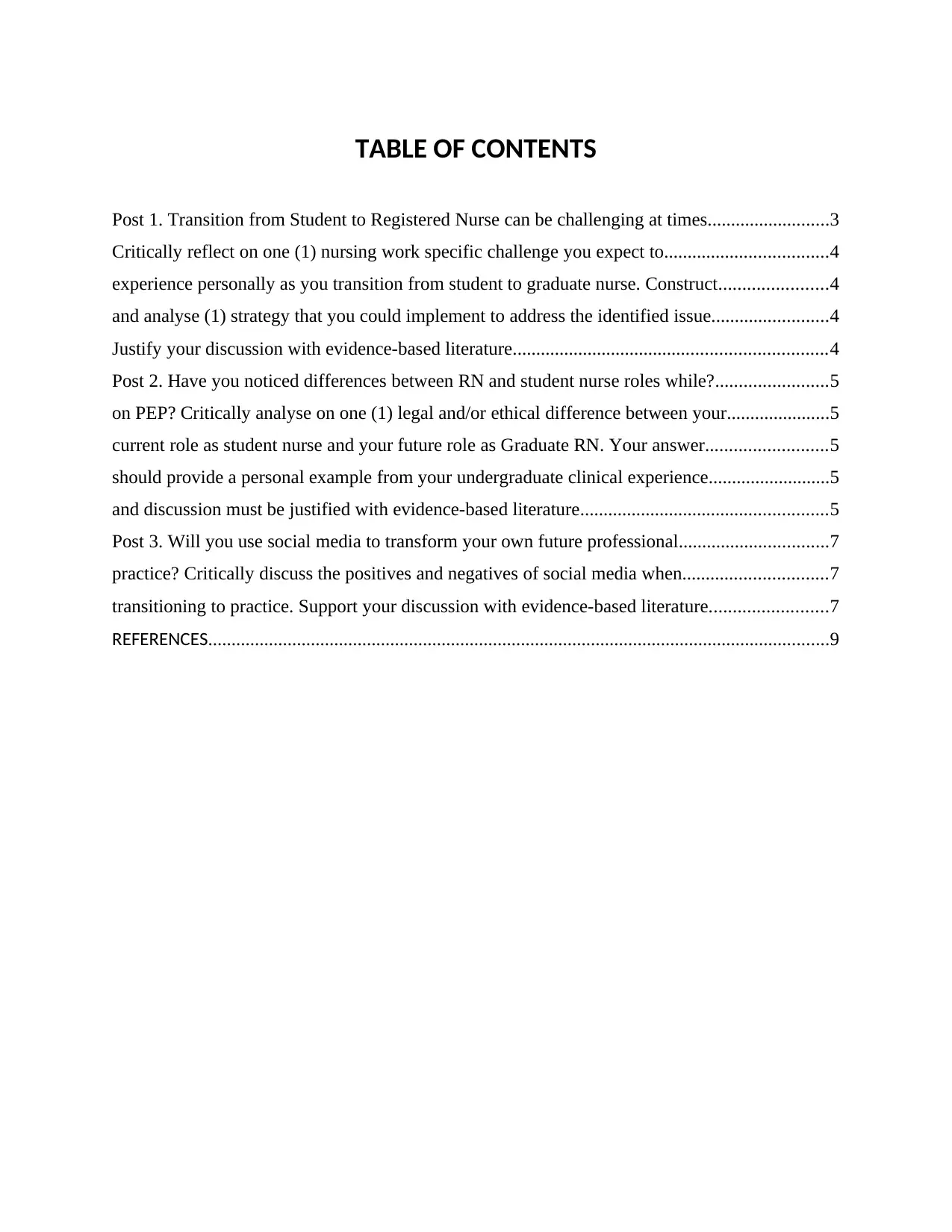
TABLE OF CONTENTS
Post 1. Transition from Student to Registered Nurse can be challenging at times..........................3
Critically reflect on one (1) nursing work specific challenge you expect to...................................4
experience personally as you transition from student to graduate nurse. Construct.......................4
and analyse (1) strategy that you could implement to address the identified issue.........................4
Justify your discussion with evidence-based literature...................................................................4
Post 2. Have you noticed differences between RN and student nurse roles while?........................5
on PEP? Critically analyse on one (1) legal and/or ethical difference between your......................5
current role as student nurse and your future role as Graduate RN. Your answer..........................5
should provide a personal example from your undergraduate clinical experience..........................5
and discussion must be justified with evidence-based literature.....................................................5
Post 3. Will you use social media to transform your own future professional................................7
practice? Critically discuss the positives and negatives of social media when...............................7
transitioning to practice. Support your discussion with evidence-based literature.........................7
REFERENCES.....................................................................................................................................9
Post 1. Transition from Student to Registered Nurse can be challenging at times..........................3
Critically reflect on one (1) nursing work specific challenge you expect to...................................4
experience personally as you transition from student to graduate nurse. Construct.......................4
and analyse (1) strategy that you could implement to address the identified issue.........................4
Justify your discussion with evidence-based literature...................................................................4
Post 2. Have you noticed differences between RN and student nurse roles while?........................5
on PEP? Critically analyse on one (1) legal and/or ethical difference between your......................5
current role as student nurse and your future role as Graduate RN. Your answer..........................5
should provide a personal example from your undergraduate clinical experience..........................5
and discussion must be justified with evidence-based literature.....................................................5
Post 3. Will you use social media to transform your own future professional................................7
practice? Critically discuss the positives and negatives of social media when...............................7
transitioning to practice. Support your discussion with evidence-based literature.........................7
REFERENCES.....................................................................................................................................9
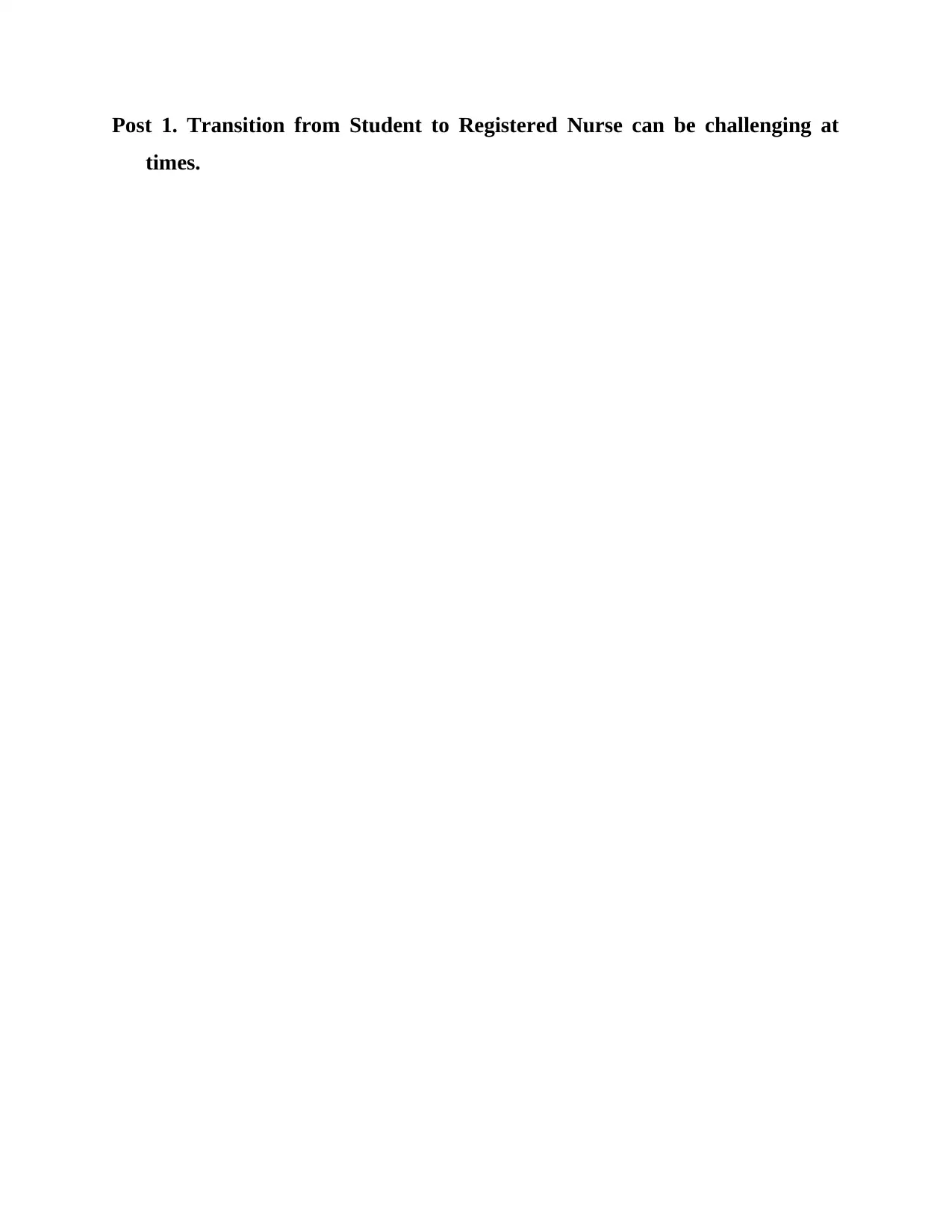
Post 1. Transition from Student to Registered Nurse can be challenging at
times.
times.
⊘ This is a preview!⊘
Do you want full access?
Subscribe today to unlock all pages.

Trusted by 1+ million students worldwide
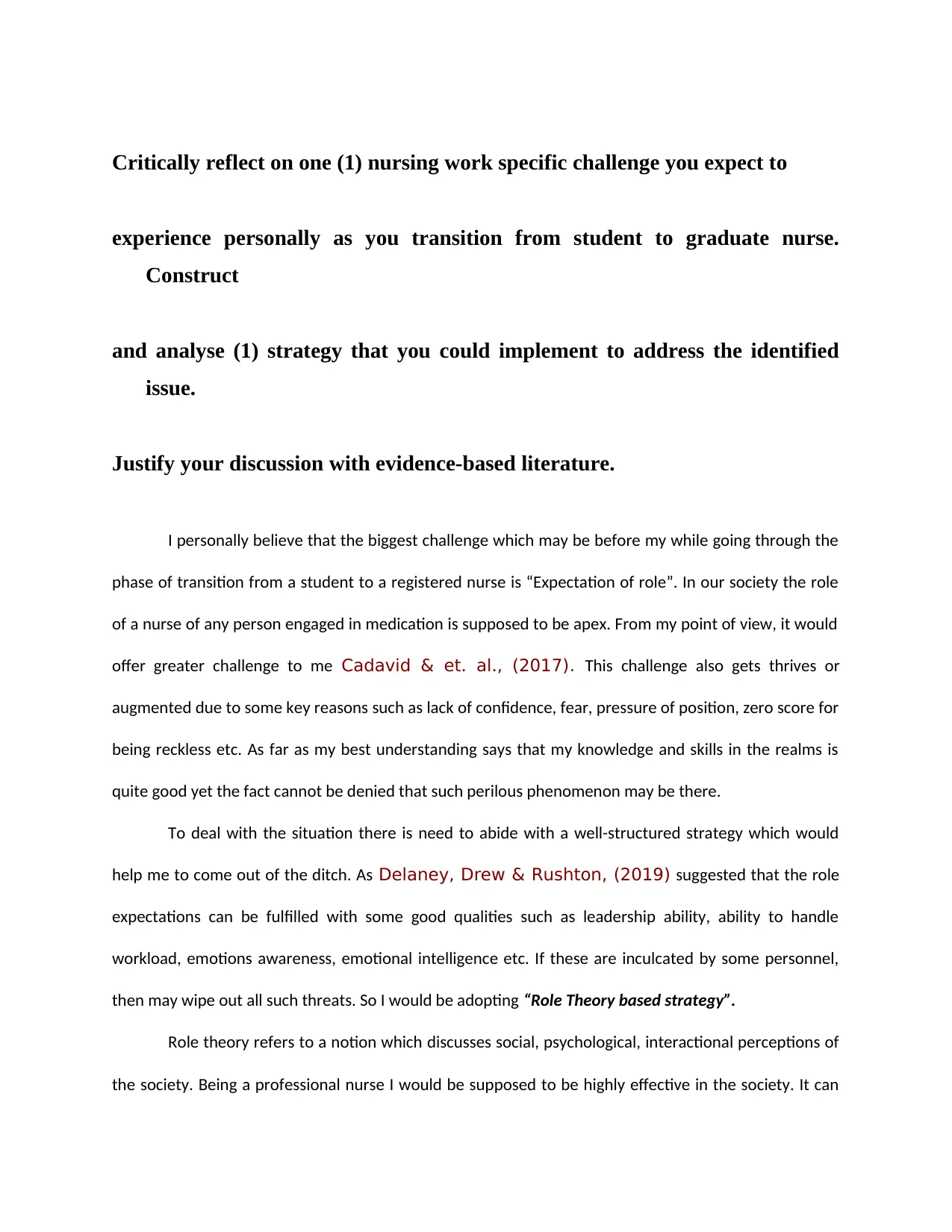
Critically reflect on one (1) nursing work specific challenge you expect to
experience personally as you transition from student to graduate nurse.
Construct
and analyse (1) strategy that you could implement to address the identified
issue.
Justify your discussion with evidence-based literature.
I personally believe that the biggest challenge which may be before my while going through the
phase of transition from a student to a registered nurse is “Expectation of role”. In our society the role
of a nurse of any person engaged in medication is supposed to be apex. From my point of view, it would
offer greater challenge to me Cadavid & et. al., (2017). This challenge also gets thrives or
augmented due to some key reasons such as lack of confidence, fear, pressure of position, zero score for
being reckless etc. As far as my best understanding says that my knowledge and skills in the realms is
quite good yet the fact cannot be denied that such perilous phenomenon may be there.
To deal with the situation there is need to abide with a well-structured strategy which would
help me to come out of the ditch. As Delaney, Drew & Rushton, (2019) suggested that the role
expectations can be fulfilled with some good qualities such as leadership ability, ability to handle
workload, emotions awareness, emotional intelligence etc. If these are inculcated by some personnel,
then may wipe out all such threats. So I would be adopting “Role Theory based strategy”.
Role theory refers to a notion which discusses social, psychological, interactional perceptions of
the society. Being a professional nurse I would be supposed to be highly effective in the society. It can
experience personally as you transition from student to graduate nurse.
Construct
and analyse (1) strategy that you could implement to address the identified
issue.
Justify your discussion with evidence-based literature.
I personally believe that the biggest challenge which may be before my while going through the
phase of transition from a student to a registered nurse is “Expectation of role”. In our society the role
of a nurse of any person engaged in medication is supposed to be apex. From my point of view, it would
offer greater challenge to me Cadavid & et. al., (2017). This challenge also gets thrives or
augmented due to some key reasons such as lack of confidence, fear, pressure of position, zero score for
being reckless etc. As far as my best understanding says that my knowledge and skills in the realms is
quite good yet the fact cannot be denied that such perilous phenomenon may be there.
To deal with the situation there is need to abide with a well-structured strategy which would
help me to come out of the ditch. As Delaney, Drew & Rushton, (2019) suggested that the role
expectations can be fulfilled with some good qualities such as leadership ability, ability to handle
workload, emotions awareness, emotional intelligence etc. If these are inculcated by some personnel,
then may wipe out all such threats. So I would be adopting “Role Theory based strategy”.
Role theory refers to a notion which discusses social, psychological, interactional perceptions of
the society. Being a professional nurse I would be supposed to be highly effective in the society. It can
Paraphrase This Document
Need a fresh take? Get an instant paraphrase of this document with our AI Paraphraser
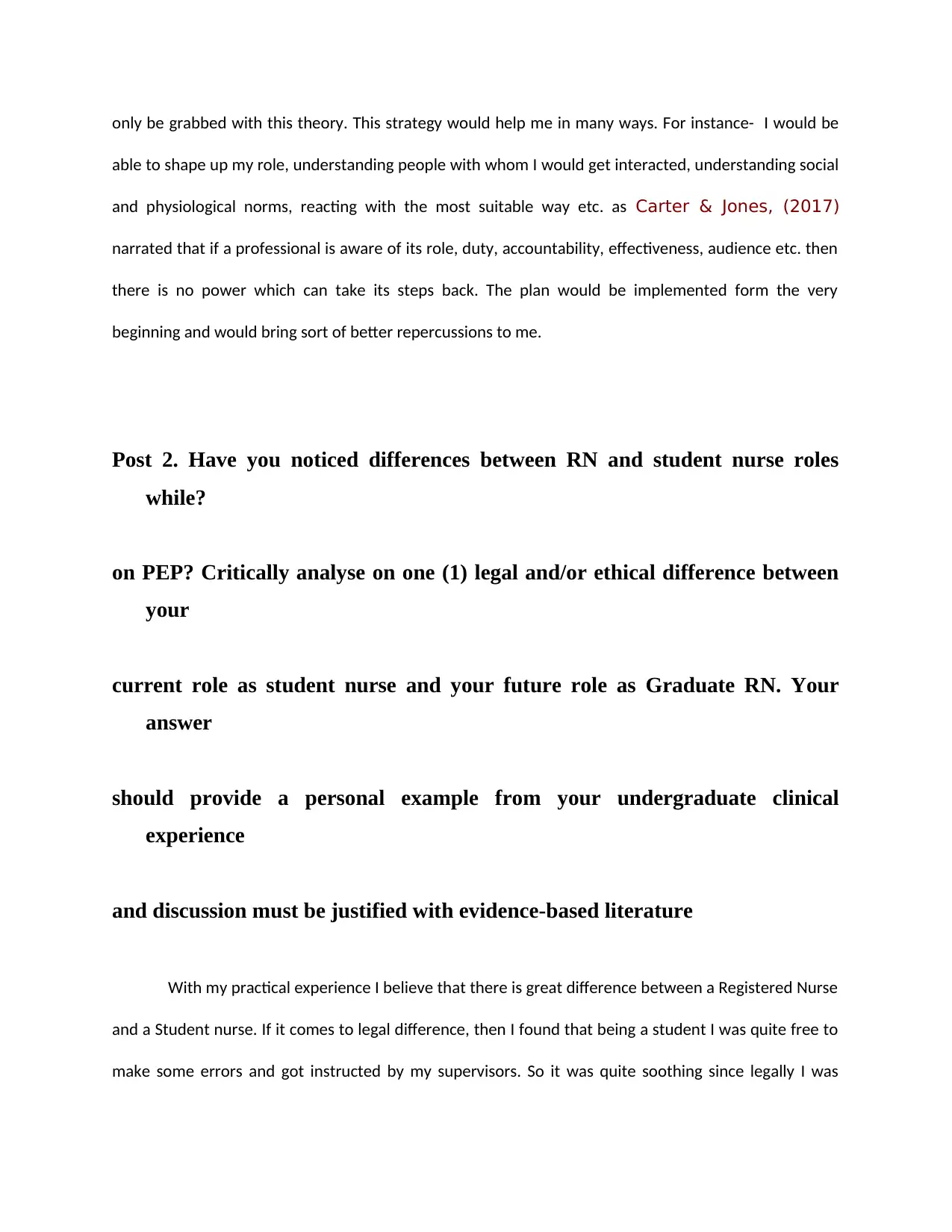
only be grabbed with this theory. This strategy would help me in many ways. For instance- I would be
able to shape up my role, understanding people with whom I would get interacted, understanding social
and physiological norms, reacting with the most suitable way etc. as Carter & Jones, (2017)
narrated that if a professional is aware of its role, duty, accountability, effectiveness, audience etc. then
there is no power which can take its steps back. The plan would be implemented form the very
beginning and would bring sort of better repercussions to me.
Post 2. Have you noticed differences between RN and student nurse roles
while?
on PEP? Critically analyse on one (1) legal and/or ethical difference between
your
current role as student nurse and your future role as Graduate RN. Your
answer
should provide a personal example from your undergraduate clinical
experience
and discussion must be justified with evidence-based literature
With my practical experience I believe that there is great difference between a Registered Nurse
and a Student nurse. If it comes to legal difference, then I found that being a student I was quite free to
make some errors and got instructed by my supervisors. So it was quite soothing since legally I was
able to shape up my role, understanding people with whom I would get interacted, understanding social
and physiological norms, reacting with the most suitable way etc. as Carter & Jones, (2017)
narrated that if a professional is aware of its role, duty, accountability, effectiveness, audience etc. then
there is no power which can take its steps back. The plan would be implemented form the very
beginning and would bring sort of better repercussions to me.
Post 2. Have you noticed differences between RN and student nurse roles
while?
on PEP? Critically analyse on one (1) legal and/or ethical difference between
your
current role as student nurse and your future role as Graduate RN. Your
answer
should provide a personal example from your undergraduate clinical
experience
and discussion must be justified with evidence-based literature
With my practical experience I believe that there is great difference between a Registered Nurse
and a Student nurse. If it comes to legal difference, then I found that being a student I was quite free to
make some errors and got instructed by my supervisors. So it was quite soothing since legally I was
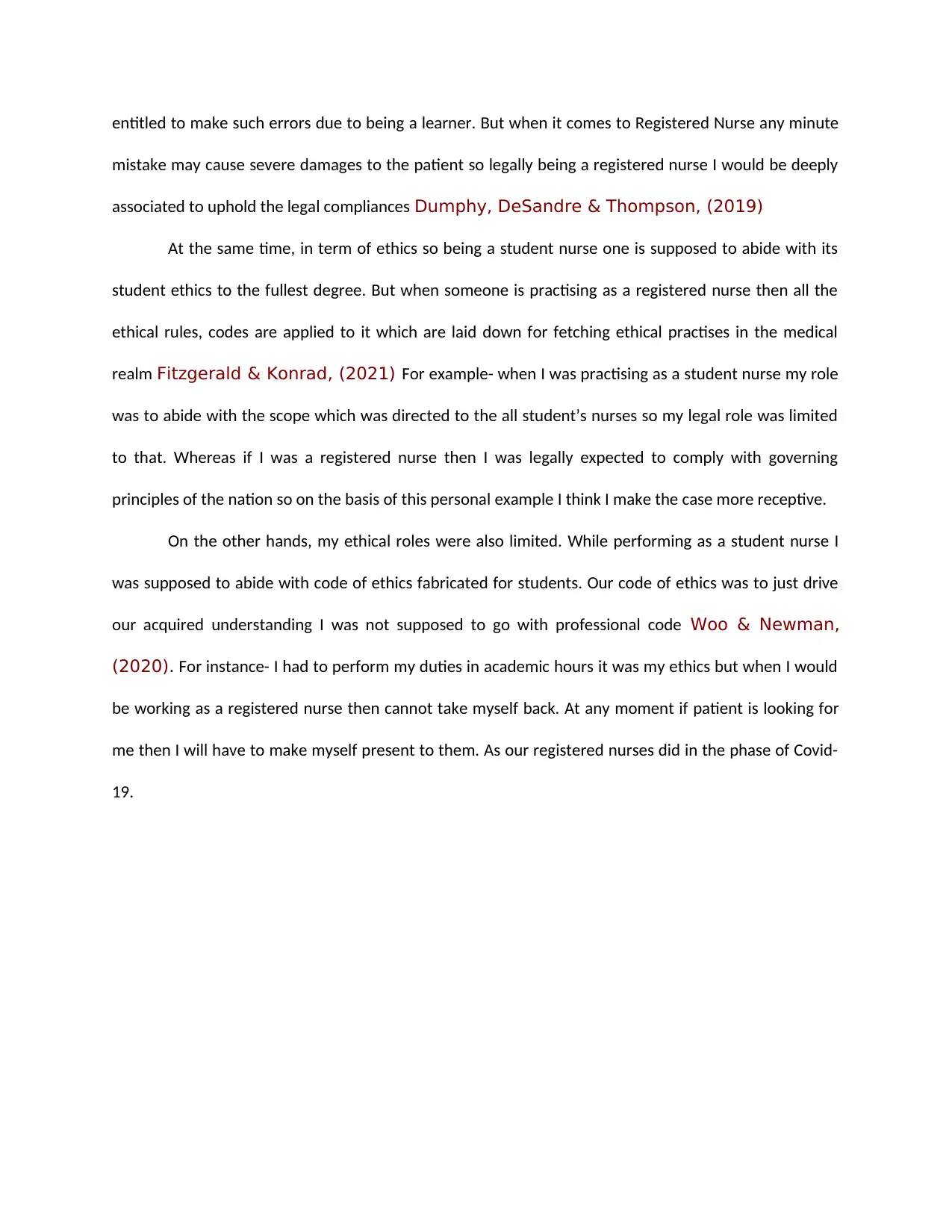
entitled to make such errors due to being a learner. But when it comes to Registered Nurse any minute
mistake may cause severe damages to the patient so legally being a registered nurse I would be deeply
associated to uphold the legal compliances Dumphy, DeSandre & Thompson, (2019)
At the same time, in term of ethics so being a student nurse one is supposed to abide with its
student ethics to the fullest degree. But when someone is practising as a registered nurse then all the
ethical rules, codes are applied to it which are laid down for fetching ethical practises in the medical
realm Fitzgerald & Konrad, (2021) For example- when I was practising as a student nurse my role
was to abide with the scope which was directed to the all student’s nurses so my legal role was limited
to that. Whereas if I was a registered nurse then I was legally expected to comply with governing
principles of the nation so on the basis of this personal example I think I make the case more receptive.
On the other hands, my ethical roles were also limited. While performing as a student nurse I
was supposed to abide with code of ethics fabricated for students. Our code of ethics was to just drive
our acquired understanding I was not supposed to go with professional code Woo & Newman,
(2020). For instance- I had to perform my duties in academic hours it was my ethics but when I would
be working as a registered nurse then cannot take myself back. At any moment if patient is looking for
me then I will have to make myself present to them. As our registered nurses did in the phase of Covid-
19.
mistake may cause severe damages to the patient so legally being a registered nurse I would be deeply
associated to uphold the legal compliances Dumphy, DeSandre & Thompson, (2019)
At the same time, in term of ethics so being a student nurse one is supposed to abide with its
student ethics to the fullest degree. But when someone is practising as a registered nurse then all the
ethical rules, codes are applied to it which are laid down for fetching ethical practises in the medical
realm Fitzgerald & Konrad, (2021) For example- when I was practising as a student nurse my role
was to abide with the scope which was directed to the all student’s nurses so my legal role was limited
to that. Whereas if I was a registered nurse then I was legally expected to comply with governing
principles of the nation so on the basis of this personal example I think I make the case more receptive.
On the other hands, my ethical roles were also limited. While performing as a student nurse I
was supposed to abide with code of ethics fabricated for students. Our code of ethics was to just drive
our acquired understanding I was not supposed to go with professional code Woo & Newman,
(2020). For instance- I had to perform my duties in academic hours it was my ethics but when I would
be working as a registered nurse then cannot take myself back. At any moment if patient is looking for
me then I will have to make myself present to them. As our registered nurses did in the phase of Covid-
19.
⊘ This is a preview!⊘
Do you want full access?
Subscribe today to unlock all pages.

Trusted by 1+ million students worldwide
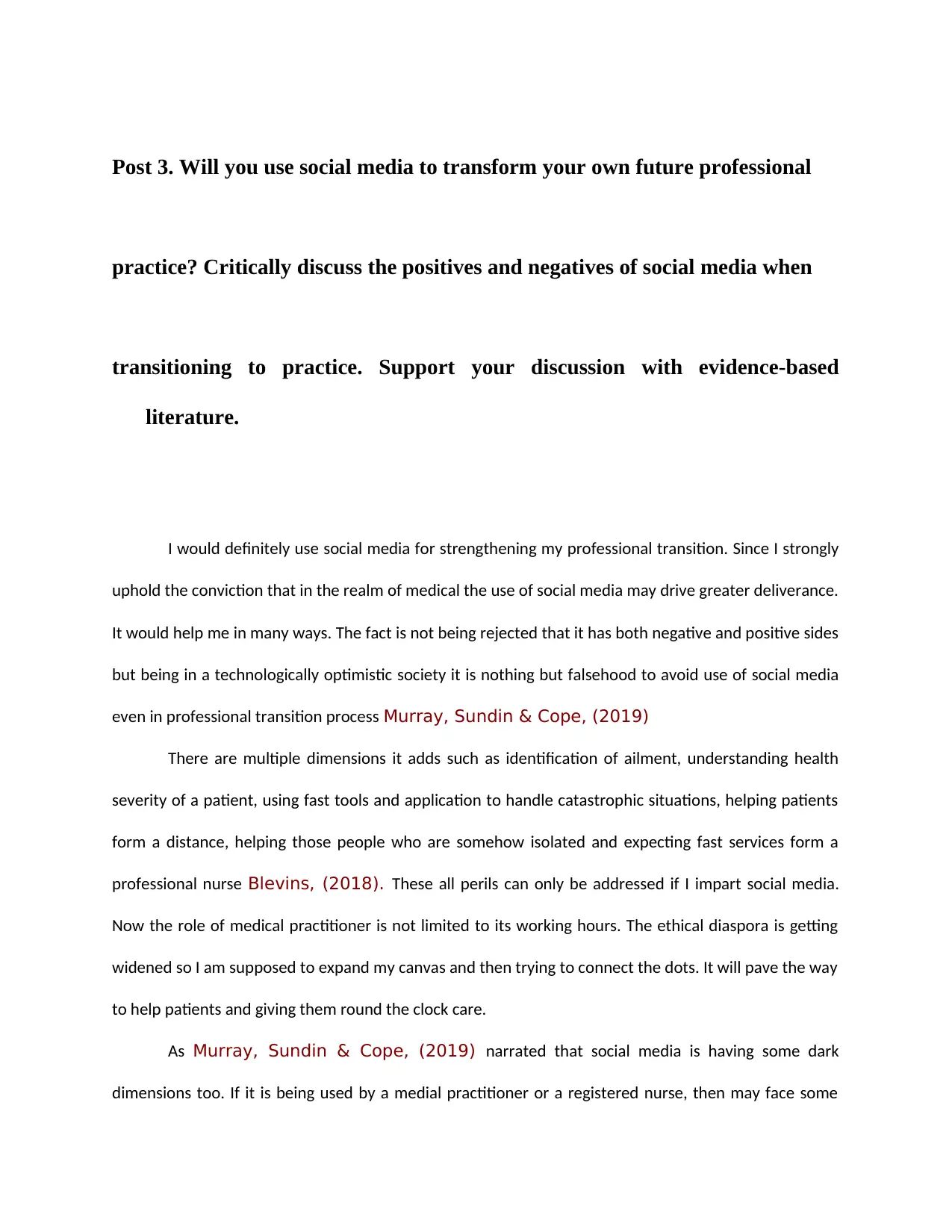
Post 3. Will you use social media to transform your own future professional
practice? Critically discuss the positives and negatives of social media when
transitioning to practice. Support your discussion with evidence-based
literature.
I would definitely use social media for strengthening my professional transition. Since I strongly
uphold the conviction that in the realm of medical the use of social media may drive greater deliverance.
It would help me in many ways. The fact is not being rejected that it has both negative and positive sides
but being in a technologically optimistic society it is nothing but falsehood to avoid use of social media
even in professional transition process Murray, Sundin & Cope, (2019)
There are multiple dimensions it adds such as identification of ailment, understanding health
severity of a patient, using fast tools and application to handle catastrophic situations, helping patients
form a distance, helping those people who are somehow isolated and expecting fast services form a
professional nurse Blevins, (2018). These all perils can only be addressed if I impart social media.
Now the role of medical practitioner is not limited to its working hours. The ethical diaspora is getting
widened so I am supposed to expand my canvas and then trying to connect the dots. It will pave the way
to help patients and giving them round the clock care.
As Murray, Sundin & Cope, (2019) narrated that social media is having some dark
dimensions too. If it is being used by a medial practitioner or a registered nurse, then may face some
practice? Critically discuss the positives and negatives of social media when
transitioning to practice. Support your discussion with evidence-based
literature.
I would definitely use social media for strengthening my professional transition. Since I strongly
uphold the conviction that in the realm of medical the use of social media may drive greater deliverance.
It would help me in many ways. The fact is not being rejected that it has both negative and positive sides
but being in a technologically optimistic society it is nothing but falsehood to avoid use of social media
even in professional transition process Murray, Sundin & Cope, (2019)
There are multiple dimensions it adds such as identification of ailment, understanding health
severity of a patient, using fast tools and application to handle catastrophic situations, helping patients
form a distance, helping those people who are somehow isolated and expecting fast services form a
professional nurse Blevins, (2018). These all perils can only be addressed if I impart social media.
Now the role of medical practitioner is not limited to its working hours. The ethical diaspora is getting
widened so I am supposed to expand my canvas and then trying to connect the dots. It will pave the way
to help patients and giving them round the clock care.
As Murray, Sundin & Cope, (2019) narrated that social media is having some dark
dimensions too. If it is being used by a medial practitioner or a registered nurse, then may face some
Paraphrase This Document
Need a fresh take? Get an instant paraphrase of this document with our AI Paraphraser
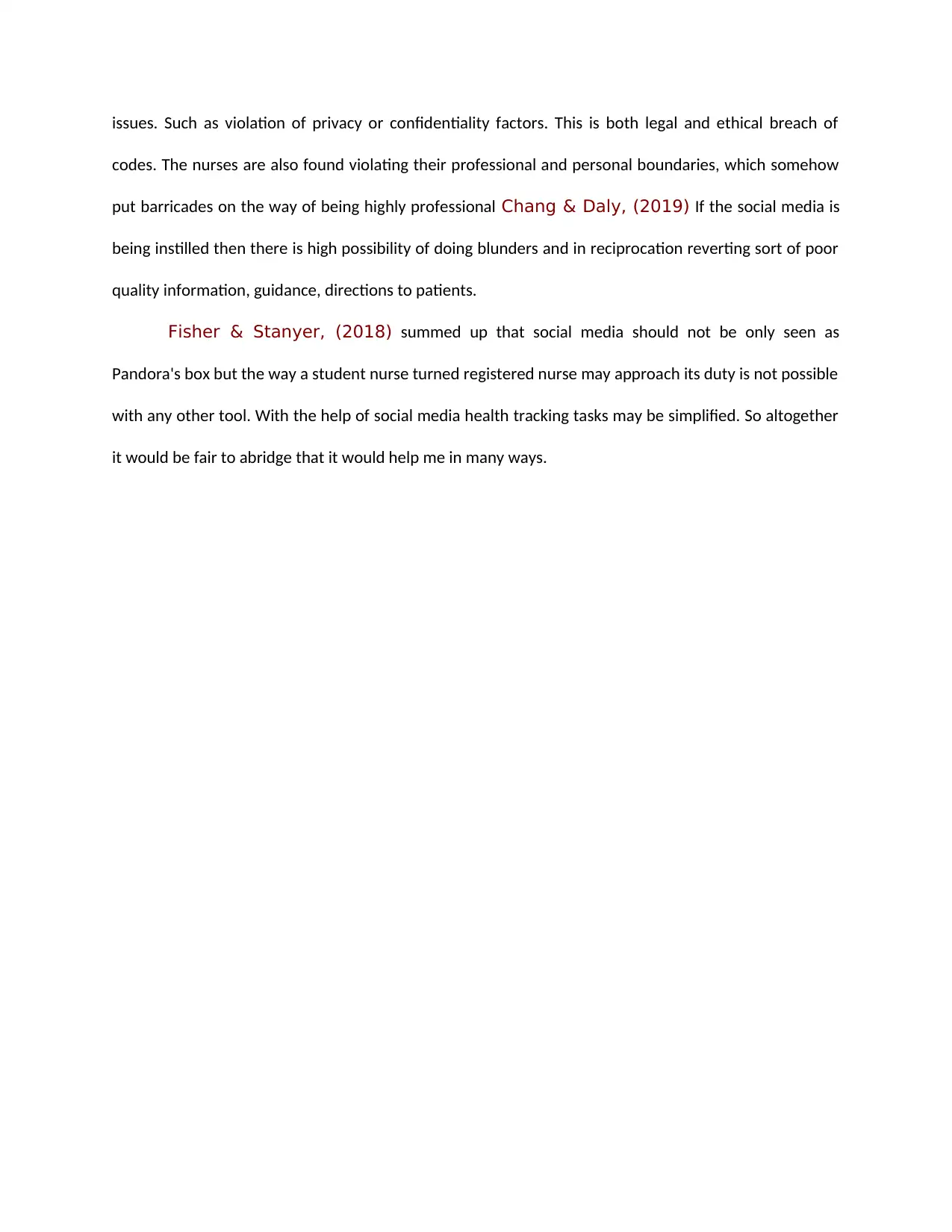
issues. Such as violation of privacy or confidentiality factors. This is both legal and ethical breach of
codes. The nurses are also found violating their professional and personal boundaries, which somehow
put barricades on the way of being highly professional Chang & Daly, (2019) If the social media is
being instilled then there is high possibility of doing blunders and in reciprocation reverting sort of poor
quality information, guidance, directions to patients.
Fisher & Stanyer, (2018) summed up that social media should not be only seen as
Pandora's box but the way a student nurse turned registered nurse may approach its duty is not possible
with any other tool. With the help of social media health tracking tasks may be simplified. So altogether
it would be fair to abridge that it would help me in many ways.
codes. The nurses are also found violating their professional and personal boundaries, which somehow
put barricades on the way of being highly professional Chang & Daly, (2019) If the social media is
being instilled then there is high possibility of doing blunders and in reciprocation reverting sort of poor
quality information, guidance, directions to patients.
Fisher & Stanyer, (2018) summed up that social media should not be only seen as
Pandora's box but the way a student nurse turned registered nurse may approach its duty is not possible
with any other tool. With the help of social media health tracking tasks may be simplified. So altogether
it would be fair to abridge that it would help me in many ways.
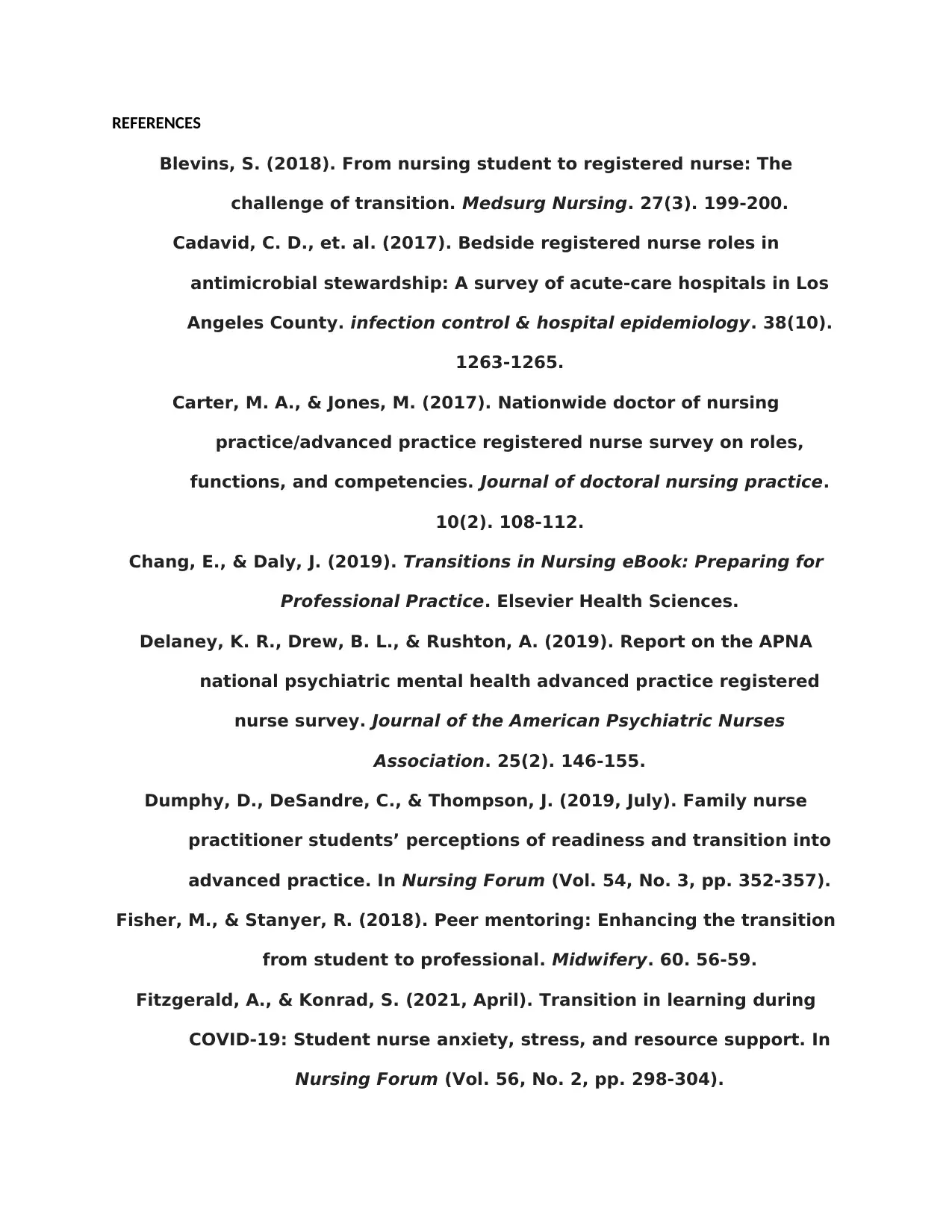
REFERENCES
Blevins, S. (2018). From nursing student to registered nurse: The
challenge of transition. Medsurg Nursing. 27(3). 199-200.
Cadavid, C. D., et. al. (2017). Bedside registered nurse roles in
antimicrobial stewardship: A survey of acute-care hospitals in Los
Angeles County. infection control & hospital epidemiology. 38(10).
1263-1265.
Carter, M. A., & Jones, M. (2017). Nationwide doctor of nursing
practice/advanced practice registered nurse survey on roles,
functions, and competencies. Journal of doctoral nursing practice.
10(2). 108-112.
Chang, E., & Daly, J. (2019). Transitions in Nursing eBook: Preparing for
Professional Practice. Elsevier Health Sciences.
Delaney, K. R., Drew, B. L., & Rushton, A. (2019). Report on the APNA
national psychiatric mental health advanced practice registered
nurse survey. Journal of the American Psychiatric Nurses
Association. 25(2). 146-155.
Dumphy, D., DeSandre, C., & Thompson, J. (2019, July). Family nurse
practitioner students’ perceptions of readiness and transition into
advanced practice. In Nursing Forum (Vol. 54, No. 3, pp. 352-357).
Fisher, M., & Stanyer, R. (2018). Peer mentoring: Enhancing the transition
from student to professional. Midwifery. 60. 56-59.
Fitzgerald, A., & Konrad, S. (2021, April). Transition in learning during
COVID‐19: Student nurse anxiety, stress, and resource support. In
Nursing Forum (Vol. 56, No. 2, pp. 298-304).
Blevins, S. (2018). From nursing student to registered nurse: The
challenge of transition. Medsurg Nursing. 27(3). 199-200.
Cadavid, C. D., et. al. (2017). Bedside registered nurse roles in
antimicrobial stewardship: A survey of acute-care hospitals in Los
Angeles County. infection control & hospital epidemiology. 38(10).
1263-1265.
Carter, M. A., & Jones, M. (2017). Nationwide doctor of nursing
practice/advanced practice registered nurse survey on roles,
functions, and competencies. Journal of doctoral nursing practice.
10(2). 108-112.
Chang, E., & Daly, J. (2019). Transitions in Nursing eBook: Preparing for
Professional Practice. Elsevier Health Sciences.
Delaney, K. R., Drew, B. L., & Rushton, A. (2019). Report on the APNA
national psychiatric mental health advanced practice registered
nurse survey. Journal of the American Psychiatric Nurses
Association. 25(2). 146-155.
Dumphy, D., DeSandre, C., & Thompson, J. (2019, July). Family nurse
practitioner students’ perceptions of readiness and transition into
advanced practice. In Nursing Forum (Vol. 54, No. 3, pp. 352-357).
Fisher, M., & Stanyer, R. (2018). Peer mentoring: Enhancing the transition
from student to professional. Midwifery. 60. 56-59.
Fitzgerald, A., & Konrad, S. (2021, April). Transition in learning during
COVID‐19: Student nurse anxiety, stress, and resource support. In
Nursing Forum (Vol. 56, No. 2, pp. 298-304).
⊘ This is a preview!⊘
Do you want full access?
Subscribe today to unlock all pages.

Trusted by 1+ million students worldwide
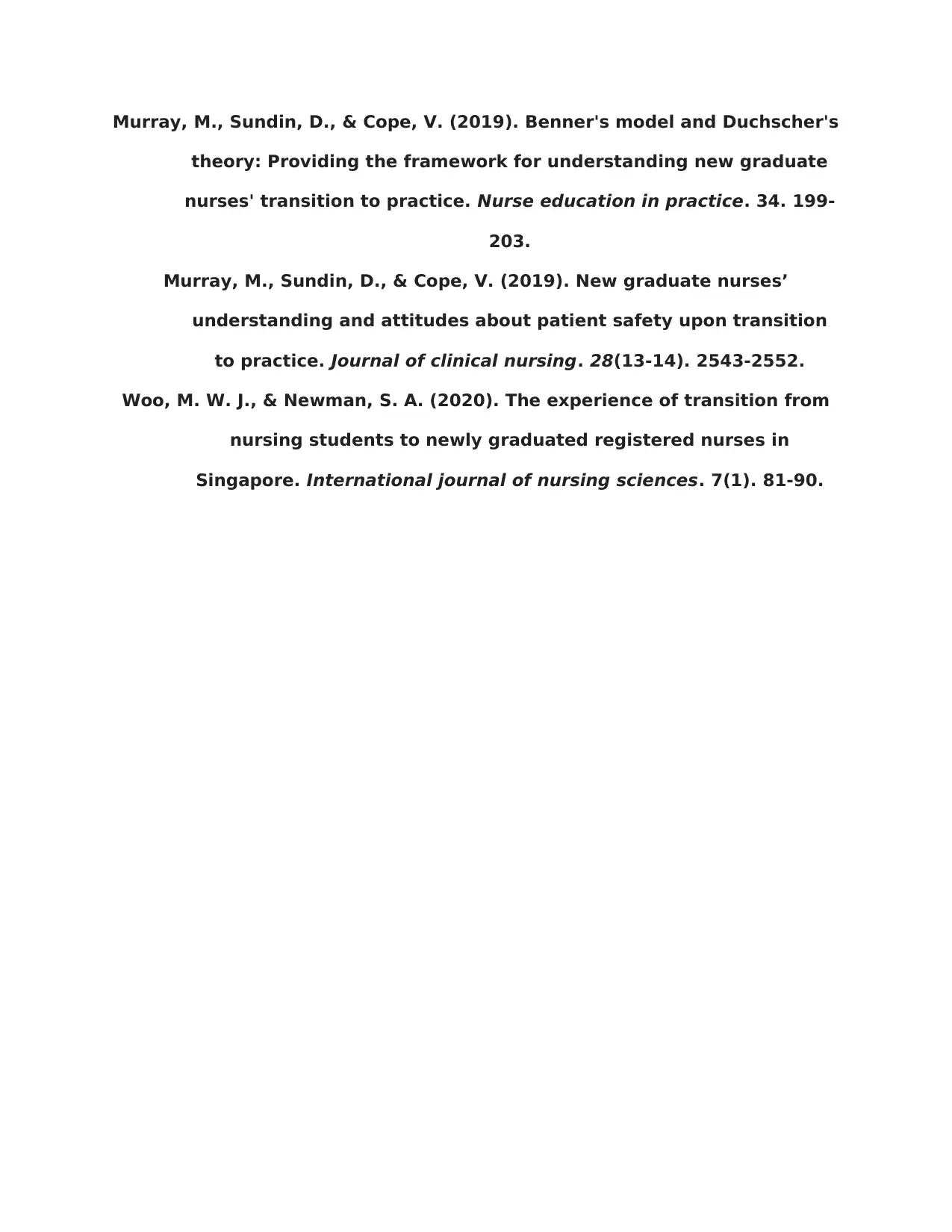
Murray, M., Sundin, D., & Cope, V. (2019). Benner's model and Duchscher's
theory: Providing the framework for understanding new graduate
nurses' transition to practice. Nurse education in practice. 34. 199-
203.
Murray, M., Sundin, D., & Cope, V. (2019). New graduate nurses’
understanding and attitudes about patient safety upon transition
to practice. Journal of clinical nursing. 28(13-14). 2543-2552.
Woo, M. W. J., & Newman, S. A. (2020). The experience of transition from
nursing students to newly graduated registered nurses in
Singapore. International journal of nursing sciences. 7(1). 81-90.
theory: Providing the framework for understanding new graduate
nurses' transition to practice. Nurse education in practice. 34. 199-
203.
Murray, M., Sundin, D., & Cope, V. (2019). New graduate nurses’
understanding and attitudes about patient safety upon transition
to practice. Journal of clinical nursing. 28(13-14). 2543-2552.
Woo, M. W. J., & Newman, S. A. (2020). The experience of transition from
nursing students to newly graduated registered nurses in
Singapore. International journal of nursing sciences. 7(1). 81-90.
1 out of 10
Related Documents
Your All-in-One AI-Powered Toolkit for Academic Success.
+13062052269
info@desklib.com
Available 24*7 on WhatsApp / Email
![[object Object]](/_next/static/media/star-bottom.7253800d.svg)
Unlock your academic potential
Copyright © 2020–2026 A2Z Services. All Rights Reserved. Developed and managed by ZUCOL.




